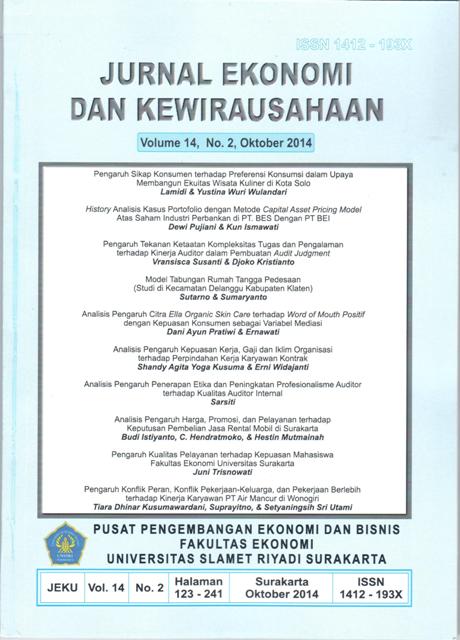PENGARUH SIKAP KONSUMEN TERHADAP PREFERENSI KONSUMSI DALAM UPAYA MEMBANGUN EKUITAS WISATA KULINER DI KOTA SOLO
Abstract
Solo is a city of tourism. Many tourism event held in Solo, which aims to create the impression (image) that Solo has a rich culture of high-value, one of which is a culinary tourism. Solo is a city that known as regional culinary like tengkleng, timlo, nasi liwet, tumpeng, and gudeg. It is attractive to foreign and domestic tourists to come at Solo. Solo government responded the situation with the place of culinary like Galabo, Ngarsopuro, Keprabon and Dapur Solo. The type of research is survey. The population of this research is consumers which take a culinary tourism in Solo. Sample of 100 people with convenience sampling technique. Data collection using questionnaires. Source of data using primary and secondary data. Analysis using Structural Equation Modeling (SEM) with AMOS. The results of hypothesis testing known that consumer attitudes positive effect on brand reliability with CR value 2,228 and p value 0,026. Positively influence consumer attitudes toward the brand intentions with CR value 2,117 and p value 0,034. Brand reliability positive influence on brand loyalty with CR value 2,220 and p value 0,026. Brand intentions positive effect on brand loyalty with CR value 2,689 and p value 0,007. Brand loyalty has positive influence on brand equity with CR value 2,142 and p value 0,032. Keywords: consumer attitudes, brand reliability, brand intentions, brand reliability, brand loyalty, brand equityDownloads
Published
2015-01-07
Issue
Section
Artikel
License
Authors who publish this journal agree to the following terms:
- Authors retain copyright and grant the journal right of first publication with the work simultaneously licensed under a Creative Commons Attribution License that allows others to share the work with an acknowledgement of the work's authorship and initial publication in this journal.
- Authors can separately make additional contractual arrangements for non-exclusive distribution published by the journal (e.g., publish it in a book), with an acknowledgement of its initial publication in this journal.
- Authors are allowed and encouraged to send their work via online (e.g., in the institutional repositories or their website) after published by the journal.









